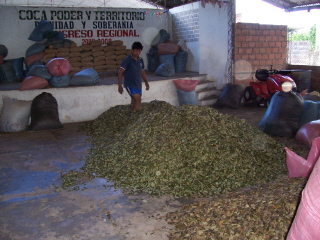In an annual report released Wednesday, Coca Cultivation in the Andean Region, the UN Office on Drugs and Crime (UNODC) found itself "surprised and shocked" to announce that the amount of land devoted to coca growing in Bolivia, Colombia, and Peru had risen to more than 181,000 hectares, or more than 700 square miles. That is a 16% increase over 2006 figures and the highest level of cultivation since 2001.

"The increase in coca cultivation in Colombia is a surprise and shock: a surprise because it comes at a time when the Colombian government is trying so hard to eradicate coca; a shock because of the magnitude of cultivation," said UNODC executive director Antonio Maria Costa. "But this bad news must be put in perspective," he added in desperate search of a silver lining. "Just like in Afghanistan, where most opium is grown in provinces with a heavy Taliban presence, in Colombia most coca is grown in areas controlled by insurgents", Costa said, noting that half of all cocaine production and a third of all cultivation occurs in just 10 of the country's 195 municipalities.
But despite the increase in coca cultivation, cocaine production remained stable. Last year, global potential production of cocaine was 994 metric tons, according to the UNODC, while in 2006, it was 984 metric tons. The UNODC pointed to lower yields as a result of pressure from massive aerial eradication, which caused farmers to seek out peripheral lands and resort to smaller, more dispersed coca patches.
"In the past few years, the Colombian government destroyed large-scale coca farming by means of massive aerial eradication, which unsettled armed groups and drug traffickers alike. In the future, with the FARC in disarray, it may become easier to control coca cultivation," Costa predicted rosily.
Last year, Colombia's drug police, working with US funds and US contractors, sprayed herbicide on 160,000 hectares of coca and manually eradicated another 50,000 hectares. But as in the past, Colombia's coca growing peasants, faced with few alternatives, have adapted rapidly, negating the gains of the eradicators.
While Congress has gone along with the $5 billion experiment to eradicate coca in Colombia in the last year of the Clinton administration and throughout the Bush presidency, the clamor is rising on Capitol Hill for a shift in emphasis in US aid. Currently, the aid goes 80% to security forces and 20% for development assistance. Solons can rightly ask just what they've been getting for all that money.
This work by StoptheDrugWar.org is licensed under Creative Commons Attribution-ShareAlike 4.0 International
Comments
The drug war is stupid!!
This is a fact!
war on something
This is how our government controls us, divides our population against each other, and uses law enforcement to profit from their seizures. We always have a war on something to have a reason to scare people into foolishly giving up their rights. So now we have no rights and no security thanks to this bull shit. War on drugs - why not a war on poverty or a war on crooked lieing politicians?
Cocaine Congress
Unlike the our government we can safely presume these guys have no problem working through the night.
Another bad habit
[email protected],Vancouver,B.C.Canada It's curious that the reasons for the drug war in the beginning had nothing to do with the harm the drugs may or may not cause but rather for reasons of racism and hysteria.Now we're stuck in this never ending cycle of erradication and interdiction which has and never will cause more than a ripple in supply.Someone has to be either really stupid or making a big pile of cash out of these failed programs.The problem seems to be that there is no accountability for any of these programs.Unless you count bodies in jail and property seizures.Even then it's a losing proposition.The drug war is a bad habit in itself.
Add new comment